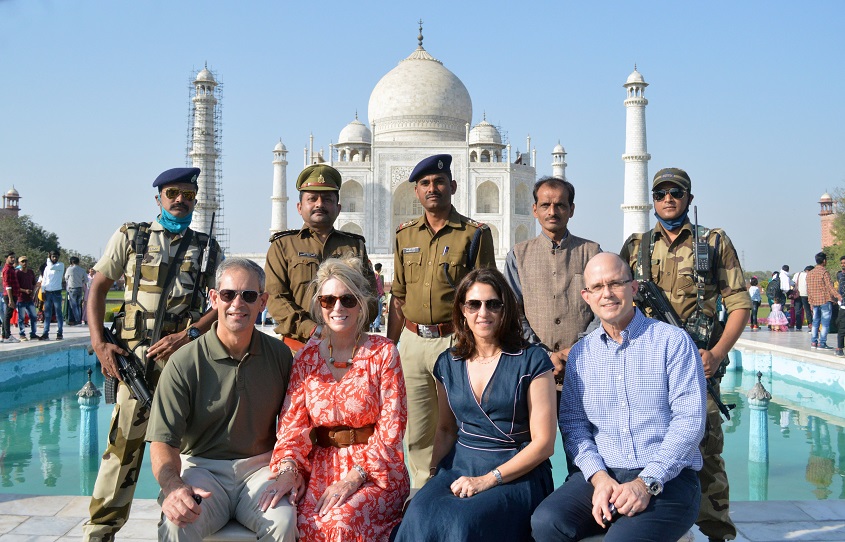From promoting bilateral trade to exchange of innovative technologies and joint health-care and education programs, the strategic dialogues between the two nations have opened up a new world of possibilities.
New Delhi: The changing dynamics of geopolitics led both India and the United States to deepen their commitment and strengthen their bilateral strategic engagement. India-US relations have come a long way and mutual perceptions about each other are being understood on almost all the matters of larger global importance. Despite having interrupting rudiments such as US’ soft corner towards Pakistan, India’s inclination towards Russia, US’ stand on global nuclear policy and more, both nations have been able to establish and sustain a very constructive strategic partnership since a long time. There were hiccups at certain junctures, for example, on Bill Clinton’s stand on India’s nuclear test in 1998, however both nations have been successful in building convergences.
Today, while standing on the crossroads in the time of Covid-19, both need to ensure their roadmap for strategic dialogue takes the right path or turn. The strategic dialogue between India and US ensembles a multi-faced mechanism of more than 30 discourses covering diverse domains ranging from civil nuclear cooperation and strengthening energy security, economic partnership, trade and commerce, agriculture, health, innovation and many more areas. India-US strategic dialogue was initiated in July 2009 with a keen focus on mutual strategic cooperation, development in direction of economy and trade, innovation in the areas of science and technology, positive progress in the domains of energy and climatic change, sustainability, education, and so on. The first round of dialogue was held in 2010 in Washington DC, followed by annual dialogues hosted by both countries in turn. With time, more strategic areas such as counter-terrorism initiatives, joint defence exercises to ensure global security, and ingenuities to control weapons of mass destruction (WMD) also acquired a significant space in these dialogues, and various engaging initiatives started between the two countries in a positive manner.
For all these years, these dialogues certainly helped both nations in building up mutual trust, cooperation and thrust in striving for mutual strategic objectives. For example, both nations took a step ahead in the direction of the historical nuclear deal that was signed between the two nations in 2008 and signed the preliminary contract for a nuclear power project in Gujarat after the strategic dialogue of 2013. During the last round of the strategic dialogue that was held between India and the US in 2019, both nations shared similar concerns in the areas of global security and challenges that come from proliferation of WMDs. Both nations also agreed to work jointly in the direction of denying access to such weapons to rogue non-state actors. The leaders from both sides have also committed to strengthen their ties in the domain of nuclear cooperation, and US agreed to establish six nuclear power plants in India, which is a significant milestone for India’s energy security. Apart from all this, US also confirmed its strong support to India’s early membership in the Nuclear Suppliers’ Group, which would pave the way for better sharing of knowledge among NSG members.
The last few dialogues also observed a keen focus on resolving various regional and global challenges ranging from terrorism to instability in West Asia and checking trans-national Islamist terror networks. After the first formal visit of Prime Minister Narendra Modi to the US in 2014, defence, trade and strategic connects between the two nations took a new refreshing turn, carving out a bright way for future relations between both nations. Apart from working closely in the direction of personnel exchanges, joint military exercises, collaboration and technology transfer in the areas of security, India and US signed a significant agreement in November 2019, the Basic Exchange and Cooperation Agreement (BECA) that now enables US to supply high-end equipment to and share real-time intelligence and information to India. This was the final one in the series of two other similar agreements, Logistics Exchange Memorandum of Agreement (LEMOA), which was signed in 2016, and Communications Compatibility and Security Agreement (COMCASA), which was signed in 2018. These agreements will certainly strengthen a comprehensive intelligence and information sharing system between the two nations.
From promoting bilateral trade to exchange of innovative technologies and joint health-care and education programs, the strategic dialogues between the two nations have indeed opened a new world of possibilities that have also extended up to multilateral exercises and initiatives such as Quadrilateral Security Dialogue (Quad). This is helping both nations in solving major global challenges like containing China’s expansionist agenda, helping the countries in getting vaccine for Covid-19 by expanding coronavirus vaccine manufacturing capacity in India and more.
An interlude occurred in the next round of strategic dialogue between the two nations, may be because of Covid-19. However, after Biden’s entry into US government as the President, it seems that he is paying special attention to resuscitate all imminent initiatives and dialogues between India and US. An example is the recent announcement by US government with regards to re-establishment of the Homeland Security Dialogue with India, which was superseded by the previous Trump administration. In the light of the optimistic future relations, the security dialogue must be organised between the two nations this year to decide upon the future course of action in terms of ensuring stability in the South Asian region, promoting sustainability, economy and trade, succeeding in the areas of global security and counter-terrorism initiatives and overall nurturing as the two mature democracies.
The strong foundation built in India-US strategic engagement as of now is a positive indication for furthering mutual interests in all the pertinent areas impacting global peace and stability. Both countries should keep continuing with the momentum of strategic cooperation for a better world.
Dr Anshu Joshi is Assistant Professor at the School of International Studies, JNU.

